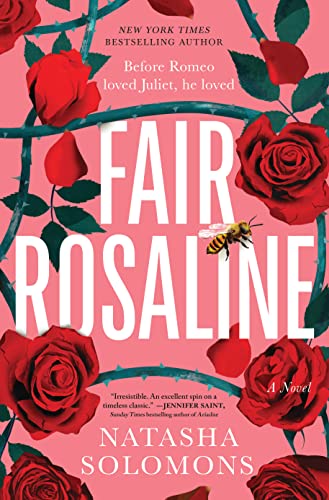Fair Rosaline
Shakespeare’s Romeo and Juliet hints at Romeo’s involvement with Rosaline before Juliet. But were there others? This is addressed in Solomons’ new novel about the unsung lover in the play. After her mother’s death, Rosaline’s choices are slim. Granted twelve days of freedom before being locked in a convent, she decides to “gorge herself on pleasure,” sneaking into a lavish Montague masque, thereby encountering Romeo. Rosaline is instantly besotted, and who can blame her? Her fate of a henceforth somber convent life is bleak.
Romeo is a practiced lothario. At 25-30 he is much older than the scholars’ estimate of Shakespeare’s 16-21-year-old, making the age discrepancy with Rosaline (15) and Juliet (13) a bit unsavoury. For all his godlike beauty, he is a predatory, smooth-talking lecher. He plies Rosaline with honeyed words and drink, encourages her to steal, and pretends outrage when she challenges him. Their intimacy is callously self-serving.
Rosaline is given a strong voice, but empowering women by vilifying all things male can detract from the message the author is trying to convey. Tybalt is the only exception in a cast of unerringly horrid men. Father Laurence is Romeo’s procurer; Romeo’s father is abusive; Rosaline’s father is cold and distant. My biggest concern is there is nothing left of the original romance, despite liberally scattered quotations, imagery and Shakespearean dialogue. The oppressive humidity of Verona is overworked, as are Rosaline’s obsessive thoughts of guilt, filth, sin, and pain. Given the mean-spiritedness of so many of the characters, I puzzled long over the author’s intent. This is a sad tale of children negotiating the adult world without suitable parental guidance. Characters are well-developed and held my attention, despite the melancholic and unsettling feel of the novel. This might be best read with no prior knowledge of the play.










